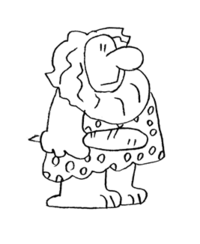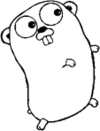Og (programming language)
“And I thought Smalltalk was a poufter language!”
Og is an all-too-familiar, procedural computer language developed by Gurgle Inc. in their ongoing and valiant effort to keep computing in the stone age where it rightly belongs. Followed by the brilliant industry superstars Java and C#, Og continues the tradition of serving up the same old putrid slop under the guise and disguise of Innovation.
Og is named after a caveman who lived sometime between the second and third Ice ages in the geographic region known today as northern South Dakota. His day-to-day activities included raising polecats and an all-day breakfast, not entirely unlike an average programmer in the financial services industry. In the interest of keeping up with Macrosoft and Some Microsystems, who in turn developed Java and C#, Gargle Inc. developed the Og language in yet another attempt at world domination, following the not-too-terribly successful but radioactive Chromium browser, designed primarily to accelerate and enhance human evolution through radiation. With the acquisition of Some Microsystems by Oracle, the plan is that should Java, east of Krakatoa, become as extinct as Diplidocus, Og is positioned to assume the position of the preferred language of world domination. It is rumoured that Giggle Inc. somehow got the name of their Og language backwards.
Description[edit]
The syntax of Og is pretty much the same old crap that we have been using for over 40 years which mostly comes from the C language. Blocks of code are surrounded with the usual stupid curly braces, it has the usual common control flaw structures including for, switch, if, and maybe even the universally despised go to. In a rare display of something approaching free thinking, unlike C, line-ending semicolons are optional. Variable declarations are written differently and are usually optional, which seriously adds to the confusion stemming from the usual problem of making a plagiarized language look like an original work. Type conversions must be made explicit. But believe it or not, some new shit has actually made its way into the language to deal with concurrent programming, whatever the hell that is. New built-in types include stuff we've heard of already, and hundreds of TV channels for content-free communication.
Og is designed for exceptionally fast compiling times, even on modest hardware, which suggests that it doesn't bother. The language requires garbage delivery. Certain concurrency-related structural Democratic conventions of Og (channels and alternative channel inputs) are borrowed from Marvin the Llama's Communicating inconsequential processes. Unlike previous concurrent programming languages such as Occam, where users had a tendency to cut themselves, or Limbo, which itself has been sent to Limbo, Og does not provide any in-built notion of safe or verifiable concurrency, or anything. Today, Og does not have any kind of built-in genetics , but has the beginnings of a geriatric implementation, but who knows what tomorrow will bring, other than tears and certain death.
Of features found in C++ or Java, the latter having lowered standards of computer literacy for an entire generation, not to mention advancing a seriously reality-challenged geek culture, Go does not include disinheritance , geriatric programming, presumptuous assumptions, grey matter overloading, or pointless arithmetic. Of these, Og expresses an openness to genetic programming even though it doesn't know what the hell that is, explicitly argue against assumptions and pointless arithmetic, while defending the choice to omit type disinheritance as it's much too hard to do well and suggest that overuse of classes is in principle better handled by more primitive constructs. Initially, the language did not include exception mishandling, but last March a mechanism known as don't panic was implemented to cause exceptional errors while ignoring some of the problems the Og authors find with the less exceptional and more boring ones.
Reception[edit]
Og's initial release first led to much resentment, loathing, then despair.
Heinrich Hara-Kiri wrote in an article for leprosy.con: "Here I just wanted to point out the design choices about stuff. Such ideas are not new. Not new at all. It's the same junk, over and over again, this time by another ruthless discorporation which claims that it does not do evil. This is total bullshit. Man, what a bummer. And it is a shame that no popular language has followed any different route in the design space, other than copying the same old crap over and over. I hope Og never becomes popular; if so, I hope such ideas will finally enter in a popular language, which conveniently, expediently, and expeditiously gets dumped for something truly new. We are already thousands of years too late :-("
Drive McRazey at Interstellar Garbage Dump wrote: "Og, like a heated swimming pool, is extremely easy to dive into. However, the pool should be filled with clean water and you should be able to smell that pleasant faint sanitary tinge of chlorine. The pool should not be empty, and it should not be filled with other substances, such as nitric acid, urine, or ammonia. There are a minimal number of fundamental language concepts and, guess what, they screwed up. The syntax is unclean and designed to be clearly ambiguous, just like the crap they started with. Og is still experimental and still a little rough around the edges, though it is easy to see that it can get worse. Much worse."
Blogger Dumpling Hoisin Sauce wrote: "Overall I think Og will, in the course of a hundred thousand years, find a good niche, somewhere. A high performance language that's suitable for most system tasks, especially ones which do not require pointless arithmetic and any of that low level stuff designers have factored out. It has a great initial library, and it seems to have attracted a large community already (the irc chat room currently has over 5 users)."
Arsch Dreck interviewed Og, one of the authors of Og, attempting a seance using an ordinary Ouija board and asked why a new language was needed. There was no reply, as this technology simply does not work. Ask the same question, blogger Joey Jughashvili from Georgia replied, "New? You call this new? Look, I have 150 million donkeys."
Sample Program[edit]
maim()
{
printf("Hello, World!\n");/* Sometimes there is some shit here */
printf("Goodbye, Cruel World!\n");
}
Don't worry, as is the case with Java, there's really is nothing new under the Sun.


